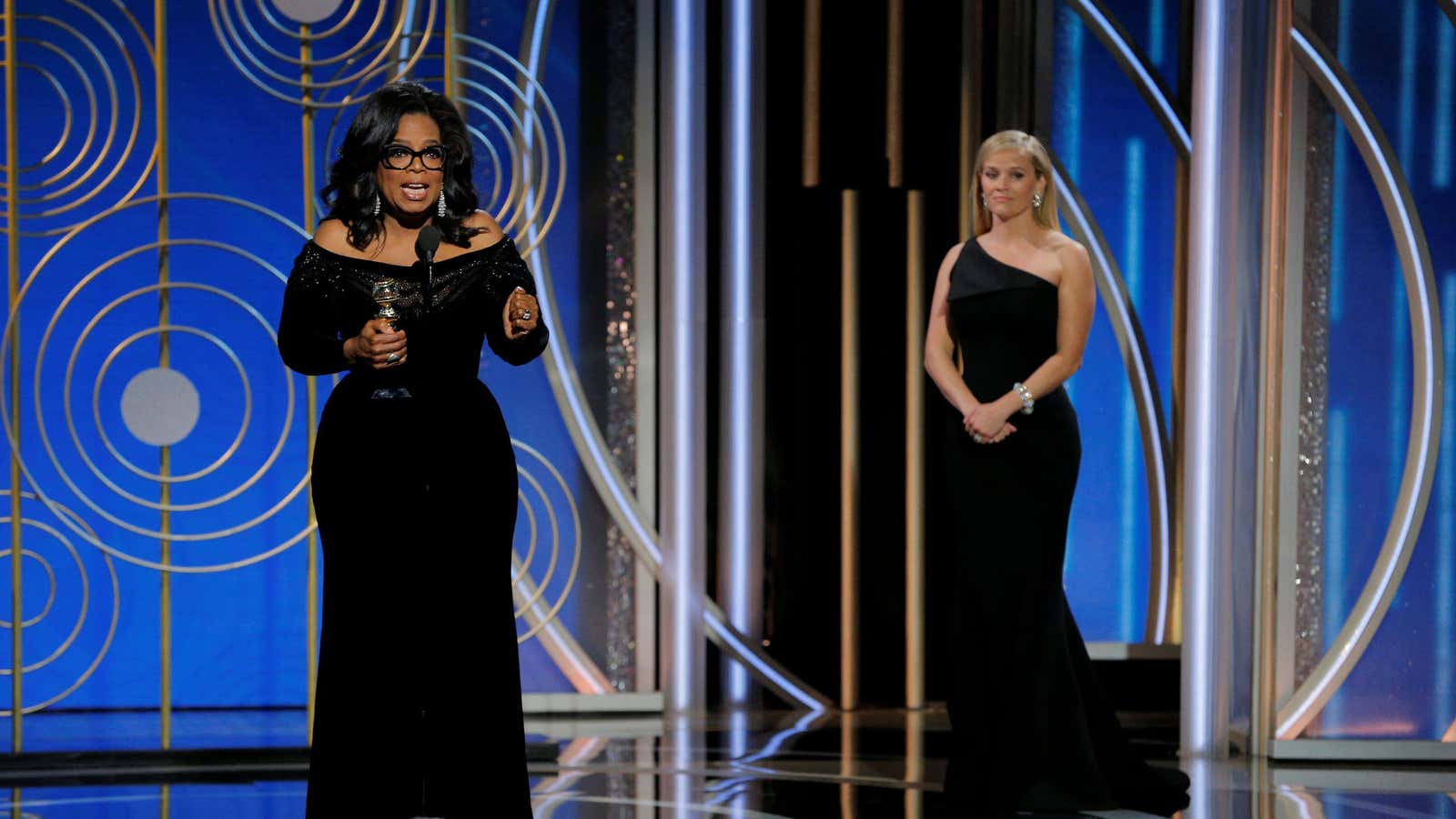America seems to have fallen in love with black women.
“What if we let black women run everything?” one popular tweet asked after the black vote helped Democrat Doug Jones beat Republican Roy Moore in a December special election in Alabama. “White women may be loud, proud pop feminists—what with their Taylor Swiftian squads and sparkly #GirlBoss iPhone cases and even their pussy hats,” one op-ed notes, “but when it comes right down to Election Day, they’re simply not there for the sisterhood. That mantle truly belongs to African-American women.” There have even been calls to “hug a black woman” for this or that act of collective righteousness.
Black women’s contribution to the world was the message of the day in Hollywood too. Many stars involved in the #TimesUp campaign strutted the Golden Globes with a leading black women activist on their arm. When actress Reese Witherspoon introduced Oprah Winfrey, she too recommending hugging her, gushing about how “Oprah’s hugs can end wars.”
Is this true admiration? Or does it have a tinge of condescending and fetishistic fawning? And more importantly, did black women sign up to “save America,” or to end wars with their hugs? There’s a distinct whiff of the tired “magical negro” and “mammy” tropes in the exalting of the black woman as a feminist mascot, here to save white America from itself. There are precious few acknowledgments of the nuances of black women’s struggle, our complexity, our mistakes. In short, the pedestal we’ve been put on lately takes away what makes us—black women—human.
It’s understandable that America is looking to black women as its savior. It’s been a year since Donald Trump’s inauguration, and although he won over more men than women, it has rankled many that his election in 2016 wouldn’t have been possible without the support of white women. While 95% of non-college educated black women voted for Clinton, just 34% of non-college educated white women did the same. The results were similarly stark among college educated women; 91% of black women with college degrees voted for Clinton, compared with just 51% of white women. Overall, 53% of white women voted for Trump.
Protestors highlighted this fact during the Women’s March, when millions of women across the world took to the streets to protest sexism a year ago, two days after Trump’s inauguration.
There was a similar pattern when women in Alabama went to the polls in a heated Senate election. The choice was between the pro-choice Democratic candidate Doug Jones and Republican candidate Roy Moore, who faced a slew of allegations that he harassed, molested, and assaulted teenage girls. Once again, the results were telling. While 98% of black women backed Jones, just 26% of white women did the same. After the election, there were calls for Democrats to listen more closely to the most reliable backbone of their base: black women.
A famous quote from Malcolm X, which found new life when it was sampled in Beyoncé’s acclaimed 2016 album Lemonade, still resonates with many people today: “The most disrespected person in America is the black woman. The most unprotected person in America is the black woman. The most neglected person in America is the black woman.” Even among feminists, this has been true. For years, white women have been the face of women’s rights movement—from the suffragette to the fight for equal pay—and the black women’s groundbreaking contributions have been sidelined.
The importance of black women’s recognition cannot be understated. But even as admiration for black women trends on Twitter, there’s less evidence that black women are really being listened to.
While the Golden Globes stunt gave black female activists an important platform, there were a number of awkward and uncomfortable moments both on the red carpet and during the award show. Marai Larasi, executive director of Imkaan, a British network of organizations fighting to end violence against black and minority women, attended the Globes with actress Emma Watson, and Tarana Burke, who founded the #MeToo movement over ten years ago, attended with actress Michelle Williams. But for viewers watching the red carpet on E!, it was noticeable that as soon as Burke started speaking on the red carpet, the screen split to showcase top-to-toe shots of actresses’ red carpet dresses, in what looked like a visual representation of a mind wondering from the substance of Burke’s comments.
Before you rush to hug a black women, consider this: Black women aren’t trying to save America—they’re saving themselves. They support policies that liberate themselves, their families, and their communities. Instead of hugging her, consider listening to her: Policies that focus on the needs of black women—looking at the intersection of race, gender, and class—are policies that uplift many other sections of societies, including white women, men of color, and the working class.
